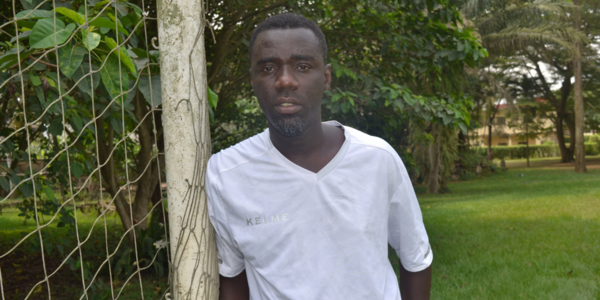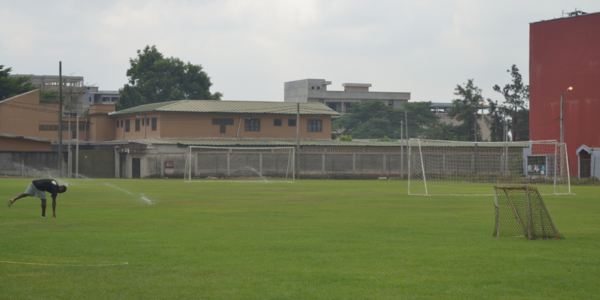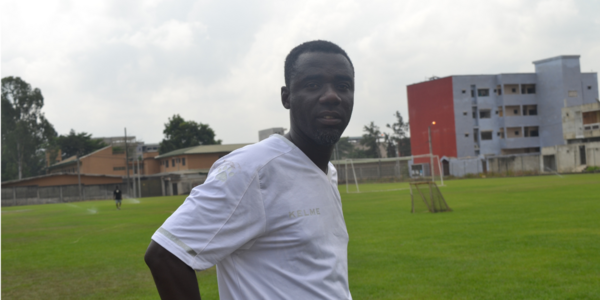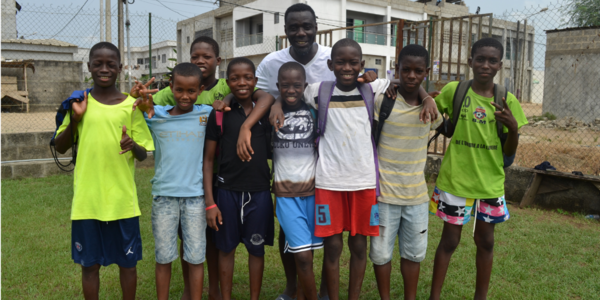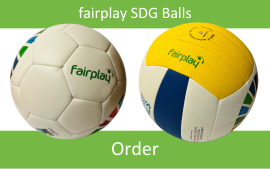Strategy instead of stadiums - Interview with Marco Né
Marco Né made the journey from Africa to Europe as a player, today he wants to promote talent with his academy in Abidjan City. During the Africa Cup in Côte d'Ivoire, Kurt Wachter interviewed the ex-international for ballesterer and spoke about advisors, the lack of youth tournaments and the legal dispute surrounding David Datro Fofana.
The abridged version of this interview was published in March 2024 in the football magazine ballesterer #186.
https://www.fairplay.or.at/en/archive/strategy-instead-of-stadiums-interview-with-marco-ne#top
Academic kids from the street
The transfer of African talent to European leagues is a profitable business. The current Africa Cup winner and host of the tournament, Côte d'Ivoire (Ivory Coast), plays an important role in this. According to the FIFA Global Transfer Report, 428 Ivorian players were transferred abroad in 2022, putting the country in third place in Africa and ninth place worldwide.
Many want to get a piece of the action with young footballers who all dream of a career in Europe. No fewer than 700 academies, training and coaching centers are registered with the Ivorian Football Federation FIF. Many of these centers operate with minimal budgets, have no places and raise false hopes.
However, there are also seriously run domestic academies that provide professional training for talented players. One of these is the academy club Abidjan City FC run by Ivorian ex-international Marco Né, himself a graduate of the legendary ASEC Mimosas youth academy.
On the first non-match day of the Africa Cup, I take a cab to the Angré district in the north of the metropolis of Abidjan. There is little sign of the glamor of the international football business here. The owner, Marco Né, greets me in front of an unadorned concrete building. After his active career, the 40-year-old bought a third division club and renamed it Abidjan City FC in 2016.
His business card reads "Footballer, a person with values.
On the way to his office, young people sit on the steps and play with their cell phones. Marco Né is happy to show me the club's latest achievement: The new training pitch, a fallow area that has been cleared of garbage by the club itself and is now sprouting green grass. Directly behind it is a monastery of the Capuchin order, hidden behind high walls, there is a large grass pitch that can be used. The changing rooms have been renovated by the monks themselves. On the way back, we meet children from the youngest age group, who are under 12. After training in the morning, they head home, as the academy currently has neither dormitories nor classrooms. Né introduces the boys to the visitor from Austria. The slight Eli, whose parents come from Mauritania, shines with expert knowledge: "David Alaba, Marko Arnautovic!" he says.
Abidjan City FC's most prominent player to date is David Datro Fofana, who joined the academy as a 14-year-old and was bought by Chelsea for €12 million last year. The 21-year-old short-time Union Berlin striker, now on loan to Burnley, is now flourishing in the Premier League, scoring twice on his home debut. However, Abidjan City have yet to see any of the millions. According to Né, his player was transferred to Molde FK in Norway in February 2021 by a dubious agent with the help of the Ivorian FA without Abidjan City's consent. Marco Né speaks of "theft" and is fighting against it. The case is currently pending at the International Court of Arbitration for Sport in Lausanne.
In the interview, Né talks about his career, how he was discovered on the street as a child and accepted into the best academy in the country and how he managed to make a professional career for himself. We talk about his vision of further developing the training club so that young people have real opportunities for a career and don't fall into the hands of self-appointed scouts who are only out to make a quick buck.
https://www.fairplay.or.at/en/archive/strategy-instead-of-stadiums-interview-with-marco-ne#top
How did you start playing football?
Marco Né: When I was ten and a half years old, Jean-Marc Guillou was on the streets of Abidjan. He wanted to set up an academy, so he needed young talent. During that time, he looked at around 10,000 players.
In my street, I was like a superstar. So they told me there's a blond guy who takes young players to Europe, so you have to come. And my mom said, OK, go, you can eat afterwards.
In the end, he took eight players to the Académie de Sol Beni, I was lucky, but I wasn't too bad either.
You were then adopted by Jean-Marc Guillou?
Marco Né: When I joined his academy, he adopted me and another player and I lived with him. His wife became like my second mother and I received a new education, she gave me everything. I was lucky because my family was very poor. We were ten children and my father didn't work. Jean-Marc said to me: 'You're going to the World Cup in 2006'. I said 'I don't think so'. My dream was just to play for ASEC Mimosas. At that time, nobody was talking about Europe.
How did things continue for you in the academy?
ASEC Mimosas won the Champions League and we played Espérance Tunis in the CAF Super Cup in 1999. Our whole group had never played in the first team before, but we were told to go and play. Nobody believed in us but we won. Kolo Touré was 17, Didier Zokora was already one of the older players at 18. I was only 15 and unfortunately didn't play.
That game changed football in Africa. People understood that you have to start with young players in order to build something. The work of Jean-Marc and his academy completely changed the game.
Very impressive indeed. And where did you go from there?
Marco Né: I went to Beveren when I was 19. The idea was for us players from the academy to stay together in Europe, because players who know and understand each other also play better together. Nobody had done that before either!
I didn't play in the first year, but it was perhaps the best thing that could have happened to me, because it gave me time to adapt. When I started playing with Yaya Touré and Yapi Yapo, we started to win.
After my time in Sol Beni, my time in Beveren was the most important experience of my entire career. It wasn't easy for us Africans, in the beginning the fans didn't understand why Africans had to come and play for their club.
So why did you switch to Olympiakos Piraeus?
Marco Né: I had the chance to go to Arsenal. I had already passed the medical check and they wanted to sign me. But unfortunately I didn't have an EU passport. I was there with Emmanuel Eboué and should have done the same. He married a Belgian woman and they signed him. That's why I went to Olympiakos. It was also a great experience there with great people and a different culture.
After Greece, my agent took me to Kuban Krasnodar in Russia. People warned me that not only were there racists there, but it was also dangerous! (laughs).
What was your relationship like with your agent?
Marco Né: I had the same agent as Yaya. But I was young, so I knew how things worked. We Africans are loyal, that's our upbringing, so I stuck with that agent. Later you understand that it was a mistake to have agents who don't really understand what you have to do for yourself. But well, I was in Russia and this agent was Russian, he worked with and a lot of players from Ivory Coast. But it was still a great experience in Russia. At first I was injured, but in my second season I was back in the top flight and played up front for a long time.
Then your career soon came to an end at 29?
Marco Né: I wanted to stay in Russia, but then moved to SK Tavriya in Ukraine. That was a mistake, not because of the country, but because of the club. But that was also the time when I was called up to the national team after a good season. The big problem was the outbreak of war in Crimea, when everything was over. I also got tuberculosis there. I could have gone to Angers, but I was tired, so I decided not to play anymore. And I already had this academy project in mind.
https://www.fairplay.or.at/en/archive/strategy-instead-of-stadiums-interview-with-marco-ne#top
So you bought this amateur club?
Marco Né: I bought the club Egnanda de Zaranou FC, but I changed the name to Abidjan City because nobody could pronounce it properly (laughs). Abidjan City is just easier to remember.
You were one of the first players to go to Europe, what did you want to do differently? What is the idea behind the project to develop young players?
Marco Né: When a player starts to turn professional, he needs to have good and professional people around him. Many players, including myself, don't make good decisions for their career. You need contacts who can mediate. A lot of players have agents who don't understand their mentality and don't care about their families. It's important to understand that a lot of players have bad careers because they don't have good people around them. I had the opportunity to get a good education, for me the Jean-Marc Guillou academy is the best, the JMG method is the best. That is my DNA.
But you also have to change the way you work. We don't expose our young players to the real conditions of competition, that's what makes the difference compared to a player from Europe. When they are 15 years old, they start to experience real competition. If you play every weekend, you can develop better. Countries like Senegal have started to work successfully here.
How do you find the players, how do you find them?
Marco Né: What you saw this morning was the best of Abidjan, because we take the best players from all the squares. We don't just go there, we organize scouting sessions at our training ground.
For two months, any player can come, they come every Wednesday, Saturday, Sunday and play, if they are off school, they come every day. We look at them and keep the best ones. We start with 25 players, then we work with 20, then 12 and at the end there are only eight players left.
There are many teams in the streets and on the pitches in what is known as the Center d'Animation. These are like a kind of small academy and there are a lot of these teams in Abidjan. And every time they have talent, they come to us or call us. Then a player stays for a day or a week. We only take players who are really talented (laughs).
What is the relationship like with other academies?
Marco Né: Of course we compete with some of the academies here, like JMG Abidjan, ASEC Mimosas or Ivoire Academy, because they also want the best talent. We have to work hard because if you don't work hard enough, people don't want to give us their players. If we take their players, then we make a deal, sometimes we give them money to buy balls, for example. And then we make a contract with the player so that if they transfer after five years we get a certain percentage. So it's very well organized, but the most important thing is to be able to identify and promote talent, because there is more talent in Côte d'Ivoire than in any other African country.
And what about school education, do the teenagers train twice a day?
Marco Né: No, at the moment they only train in the morning and in the afternoon a teacher professor comes to the house. But when they sleep here, we will also have a teacher here. We also have some schools nearby, some players can go to these schools, but only when there is no training. Because now they are focused on becoming football players. This is a challenge for us, because we have to work to give them the chance to become footballers. You can't be a footballer and a doctor. It's not possible.
Socrates, the Brazilian was a doctor!
Marco Né: Yes, but you have to create the conditions for that. So if we want Abidjan City to have doctors and good footballers at the same time, we need really good teachers to teach here on site. You can't do that in a public school, which starts at 10:30 and finishes at 17:00. You can't play football with this schedule. It's not possible.
https://www.fairplay.or.at/en/archive/strategy-instead-of-stadiums-interview-with-marco-ne#top
This requires money, where does the income for your club come from?
Marco Né: When a player turns 18 and we can sell him to develop the team, it's obviously a good opportunity for us. At Abidjan City, we currently have 12 people working at the club. We are not a big club, but these people have to live.
One of your players was David Fofana, who is now starting out in England.
Marco Né: David came here when he was 14 years old, he was always just an Abidjan City player. David started playing for us early on, in his second season he was the top scorer in the third division. I used him early on because he had a lot of strength and power. We then loaned him out to the first division club AFAD Djékanou, where he was the best player straight away at the age of 16. His contract with us ran until 2022. He then went to Norway for two weeks and Molde wanted him, but Strasbourg and Angers also wanted him.
But then there was a problem?
Marco Né: However, one month before he turned 18, his mother claimed that the signature on the Abidjan City contract was not hers. She wanted to break the contract. The association also played along and issued an international transfer certificate. Molde announced the transfer in February 2021. As we then learned, the Norwegian agent Atta Aneke paid the family.
We went to FIFA, of course, and now we're at CAS saying that Molde stole the player with the help of the federation. This case has been going on for two years now, so we have a lot of problems with the federation. But it should be over soon, the decision will be made shortly.
There's also a lot of money at stake for your club, isn't there?
Marco Né: That's one thing, but such machinations are killing our football, because it's destroying the people who do a good job and give young players a serious education. The people in the association only work for themselves, not for football. They work with agents and steal players. We have a big mafia system in our football. Nobody wants to talk about it because the clubs are afraid. That's why this CAS case is very important. We have to stop these corrupt people because it's dangerous for football
But there is obviously also a problem with the European clubs, who are playing along with the game?
Marco Né: Molde wanted to bury the whole thing because Chelsea don't want a scandal, so they wanted a deal without a scandal to stop everything. But I said no! We want them to understand that you can't push these poor families by giving them money, because they'll do anything for €15,000.
What Molde are doing is dangerous, they stole our player and made millions of euros after just two years with him. They say Abidjan City is just a village team and they want to take money from us. That is unbelievable.
What needs to change and can the Africa Cup help?
Marco Né: The new stadiums are wonderful and the pitch is incredible. But we don't really need this Africa Cup. Of course people are happy, but we don't need it for the development of our football. In this country, we haven't even had football competitions for young players since 2015! This Africa Cup is like poison. It's a lot of money that we could use better for the development of our football. We don't need expensive stadiums, we need a long-term strategy to develop and build our football.
When young players are brought to Europe from Africa, many people talk about exploitation. How do you see it?
Marco Né: When I started the project here, I had two players, 18 and 19 years old, and one day they disappeared. I later found out that one was in Italy and the other was dead. That's also the reason why I'm doing this. We have to show them that they can believe in their talent, their dream. I'm not just talking about football. However, football has the potential to inspire and retain many young people. That has an effect on the boys.
If we don't manage that, they will go to Europe at any cost The young people don't want to emigrate, it's dangerous and they're not crazy. Sometimes the family urges them to go. They say that if you go, you'll bring money with you. That's difficult! So we have to change that, in football we try to do that. That's why I wanted players like Didier Zokora or Aruna Dindane not to stay in the national team, but to create an academy where they give opportunities to young players that they also got when they were young. We have to work together, otherwise many of the players will end up in Lampedusa.
Note: The observation of the human rights situation and the reporting from the 34th Africa Cup took place as part of the "Our Game for Human Rights" project funded by Austrian Development Cooperation.
https://www.fairplay.or.at/en/archive/strategy-instead-of-stadiums-interview-with-marco-ne#top
https://www.fairplay.or.at/en/archive/strategy-instead-of-stadiums-interview-with-marco-ne#top


